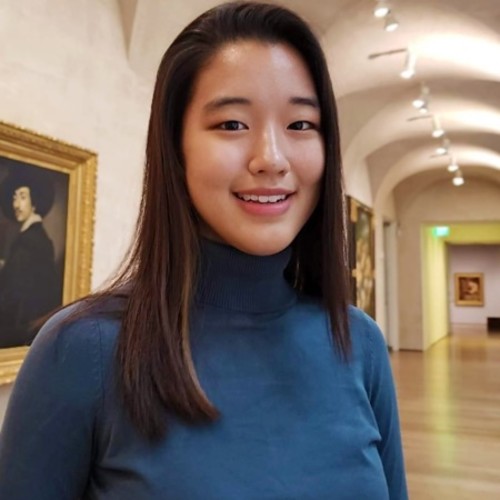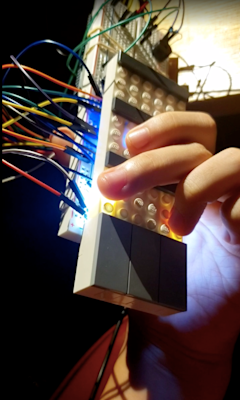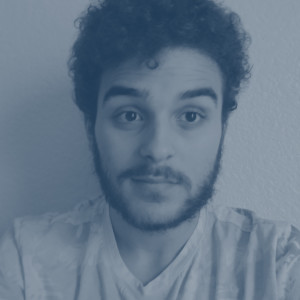Grace Kim, 20

Before beginning her studies at Harvard University, Grace felt lost navigating the seemingly limitless possibilities in STEM as a minority within the engineering community. It wasn’t until she participated in numerous hackathons (many of which were sponsored and hosted by MLH) that she found herself on a track that guided her toward an innovative, fast-paced environment that welcomes and fosters diverse perspectives.
Grace’s favorite project is the guitar learning website, Musitar, which provides individuals without access to a guitar an alternative way to practice and learn the instrument. Through the unique synthesis of LEGOs and Arduino, she designed a compact, portable guitar neck that can be used to have active practicing sessions to learn various chord positions. This project holds importance to Grace, who built the project during the COVID-19 pandemic as an outlet to design, build and have fun. Through Musitar, Grace and her hackathon team could make staying safe at home a meaningful, cooperative experience for others as well.
Grace believes in the importance of others exposing themselves to every accessible option and tool in STEM today for the sake of career growth and self-assessment. Both of Grace’s parents moved to the United States from South Korea, working countless hours to make ends meet. Seeing the hardships they endured as immigrants gave Grace the immense drive to support her parents and community, who have supported her all her life. This led to a majority of her work taking place in the education sector, working each summer to help teach students at her local elementary school in their summer school enrichment program.
A first-generation, low-income student herself, Grace understands the importance and difficulty for younger, underprivileged, minority software developers to gain practical, authentic coding experiences. As a proponent of bringing widespread engagement and support to the Open Source project community, she is consistently seeking ways to enact meaningful change with her skills. She was able to work on Resistbot, an Open Source project which aims to help connect constituents with their U.S. Congressional representative via a simple messaging platform. She wrote various YAML configuration files, connecting Resistbot’s messaging platform deliveries to the contact forms on each US representative’s page. This sounds like a lot, because it was. But, despite the sheer size of the project, Grace felt empowered by the opportunity to contribute her self-taught programming knowledge with the end goal of lasting change.
It was this same work with Open Source projects that led to Grace’s current position as a Code for America Community Fellow. Here, she has spent months assisting local governments in ensuring the effective address of the service delivery inequities in underserved communities. With the help of her team members, Grace is creating a web-based application platform to provide residents a more accessible and simple application for the City of Fort Collins government’s income-qualified programs.
In any area, Grace wants to ensure that she is giving back to our communities and uplifting others to take inspiration from the journey that she has taken. She is grateful to have been surrounded by this community that supports inclusion and interconnectivity through MLH hackathons, and she is excited to keep following the path she has chosen.
Quick Facts

Grace Kim, 20

Before beginning her studies at Harvard University, Grace felt lost navigating the seemingly limitless possibilities in STEM as a minority within the engineering community. It wasn’t until she participated in numerous hackathons (many of which were sponsored and hosted by MLH) that she found herself on a track that guided her toward an innovative, fast-paced environment that welcomes and fosters diverse perspectives.
Grace’s favorite project is the guitar learning website, Musitar, which provides individuals without access to a guitar an alternative way to practice and learn the instrument. Through the unique synthesis of LEGOs and Arduino, she designed a compact, portable guitar neck that can be used to have active practicing sessions to learn various chord positions. This project holds importance to Grace, who built the project during the COVID-19 pandemic as an outlet to design, build and have fun. Through Musitar, Grace and her hackathon team could make staying safe at home a meaningful, cooperative experience for others as well.
Grace believes in the importance of others exposing themselves to every accessible option and tool in STEM today for the sake of career growth and self-assessment. Both of Grace’s parents moved to the United States from South Korea, working countless hours to make ends meet. Seeing the hardships they endured as immigrants gave Grace the immense drive to support her parents and community, who have supported her all her life. This led to a majority of her work taking place in the education sector, working each summer to help teach students at her local elementary school in their summer school enrichment program.
A first-generation, low-income student herself, Grace understands the importance and difficulty for younger, underprivileged, minority software developers to gain practical, authentic coding experiences. As a proponent of bringing widespread engagement and support to the Open Source project community, she is consistently seeking ways to enact meaningful change with her skills. She was able to work on Resistbot, an Open Source project which aims to help connect constituents with their U.S. Congressional representative via a simple messaging platform. She wrote various YAML configuration files, connecting Resistbot’s messaging platform deliveries to the contact forms on each US representative’s page. This sounds like a lot, because it was. But, despite the sheer size of the project, Grace felt empowered by the opportunity to contribute her self-taught programming knowledge with the end goal of lasting change.
It was this same work with Open Source projects that led to Grace’s current position as a Code for America Community Fellow. Here, she has spent months assisting local governments in ensuring the effective address of the service delivery inequities in underserved communities. With the help of her team members, Grace is creating a web-based application platform to provide residents a more accessible and simple application for the City of Fort Collins government’s income-qualified programs.
In any area, Grace wants to ensure that she is giving back to our communities and uplifting others to take inspiration from the journey that she has taken. She is grateful to have been surrounded by this community that supports inclusion and interconnectivity through MLH hackathons, and she is excited to keep following the path she has chosen.
Quick Facts




